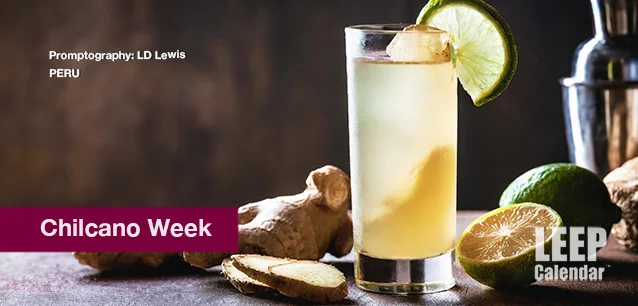 AD
AD
Today is: November 20
Scroll to explore events active on this date.
LEEP INK FEATURES

August? Absolutely!
In August, we live through the Dog Days of Summer. It's hot and often humid, and those who can leave for better climates do. Down south, winter is in full force. August is also known as "the ...

In The Heat of July: July 2025 Events
Is it hot enough (or cold enough if you're below the equator) for you yet? There is actually a day for that! Like every month, I pick a diverse collection of events you may or may not know about. This ...

May Blooms: Events in May 2025
Along with October, May is one of the most densely packed months of the year. It's before the summer humidity and the last whole month of the school year. The weather is warming in t...
About Chilcano Week in Peru
Brazil & South America
Ends: Jan 19, 2024
DESCRIPTION:
Chilcano Week in Peru is a celebration dedicated to one of the country's most beloved cocktails, the Chilcano. The event gained popularity in the early 2010s. Its inception is a testament to the growing interest in Peruvian cuisine and beverages nationally and internationally.
The Chilcano cocktail, traditionally made with Pisco (a Peruvian grape brandy), lime juice, ginger ale, and a few drops of bitters, is a staple in Peruvian bars and restaurants. Chilcano Week began to celebrate this classic drink and to promote Pisco, an essential component of Peruvian cultural heritage.
Throughout the week, participating bars and restaurants across Peru, especially in cities like Lima and Cusco, offer special menus and promotions featuring various versions of the Chilcano. These establishments often experiment with new flavors and ingredients, showcasing Pisco's versatility and Peruvian mixology's creativity.
In addition to enjoying Chilcanos, people participate in a variety of events organized during the week. These can include mixology classes, Pisco tastings, and workshops where attendees learn about the history of Pisco and the art of cocktail making. Some events also focus on pairing Chilcanos with traditional Peruvian dishes, providing a comprehensive experience of Peru's rich culinary culture.HOW IS GRAPE WINE DIFFERENT THAN GRAPE BRANDY?
Grape brandy and grape wine are products derived from grapes, but they are distinct in their production processes, characteristics, and consumption.
GRAPE WINE
Fermenting crushed grapes using yeast creates wine. The yeast consumes the sugar in the grapes and converts it into alcohol and carbon dioxide. This fermentation process usually lasts a few days to a week.
Wines typically have an alcohol content ranging from about 8% to 15%. There are numerous varieties of wine, including red, white, rosé, and sparkling, each with its specific production method and grape variety. Wine does not require a distillation or aging process to alter its alcohol content or flavor profile significantly.
GRAPE BRANDY
Distilling fermented grape juice creates brandy. The distillation process involves heating the wine to create steam, which is then cooled to form a liquid. Brandies typically have a higher alcohol content than wine, usually around 35% to 60% alcohol by volume.
After distillation, brandy is traditionally aged in wooden casks. The aging process can last several years, significantly influencing the brandy's flavor, color, and quality. Brandy is usually consumed in smaller quantities than wine, often served as a digestif or used in cocktails.
Both grape wine and grape brandy originate from grapes; wine is a fermented beverage, and brandy is a distilled beverage with a higher alcohol content.
Chilcano Week plays a significant role in supporting local businesses, particularly boutique producers of Pisco. It boosts tourism and fosters a sense of pride in Peru's national products and traditions. The week-long event has become a fixture in Peru's cultural calendar, attracting locals and tourists eager to explore the flavors and traditions of Peruvian cuisine.
VIDEOS
SUPPORTING DOCUMENTS
Currently, this event does not have supporting documents.
ADDITIONAL IMAGES
Currently, this event does not have supporting images.
Where would you like to go now?
 AD
AD


/footer-logo.svg)
